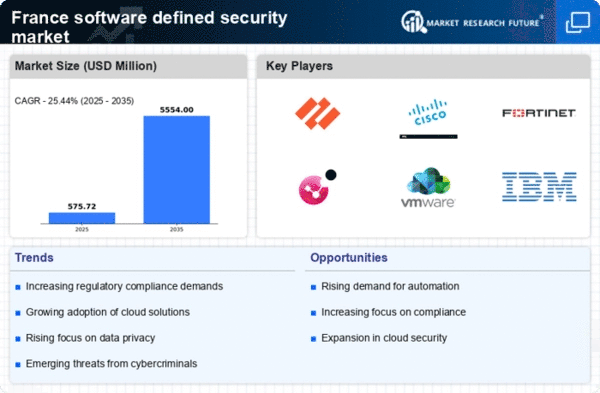Rising Cyber Threat Landscape
The software defined-security market in France is experiencing heightened demand due to an increasingly complex cyber threat landscape. Cyberattacks have surged, with reports indicating a 30% increase in incidents over the past year. This escalation compels organizations to adopt advanced security measures, leading to a greater reliance on software defined-security solutions. As businesses recognize the need for robust protection against sophisticated threats, investments in this market are projected to grow significantly. The urgency to safeguard sensitive data and maintain operational integrity drives the adoption of innovative security technologies, positioning the software defined-security market as a critical component of France's cybersecurity strategy.
Shift Towards Remote Work Security
The transition to remote work has fundamentally altered the security requirements for organizations in France, thereby influencing the software defined-security market. With approximately 40% of the workforce now operating remotely, traditional security measures are proving inadequate. This shift necessitates the implementation of software defined-security solutions that can effectively protect remote access points and ensure secure data transmission. Companies are increasingly investing in these technologies to mitigate risks associated with remote work, which has become a permanent fixture in many sectors. As a result, the software defined-security market is likely to see sustained growth as organizations prioritize securing their remote infrastructures.
Increased Focus on Data Privacy Regulations
In France, the software defined-security market is significantly impacted by stringent data privacy regulations, such as the General Data Protection Regulation (GDPR). Compliance with these regulations requires organizations to implement comprehensive security measures to protect personal data. As non-compliance can result in hefty fines, businesses are compelled to invest in software defined-security solutions that ensure adherence to legal standards. The market is projected to expand as companies seek to enhance their security frameworks to meet regulatory demands. This focus on compliance not only drives investment but also fosters innovation within the software defined-security market, as organizations look for effective ways to safeguard sensitive information.
Growing Demand for Integrated Security Solutions
The software defined-security market in France is witnessing a growing demand for integrated security solutions that offer comprehensive protection across various platforms. Organizations are increasingly seeking to consolidate their security measures to streamline operations and enhance efficiency. This trend is driven by the realization that fragmented security systems can lead to vulnerabilities and increased operational costs. As a result, the software defined-security market is evolving to provide solutions that integrate seamlessly with existing IT infrastructures. This shift towards holistic security approaches is likely to propel market growth, as businesses prioritize solutions that offer both flexibility and robust protection against emerging threats.
Emergence of Advanced Threat Detection Technologies
The software defined-security market in France is being shaped by the emergence of advanced threat detection technologies, which are essential for identifying and mitigating sophisticated cyber threats. Innovations in machine learning and artificial intelligence are enabling organizations to enhance their security postures by providing real-time threat intelligence and automated response capabilities. As these technologies become more accessible, businesses are increasingly adopting software defined-security solutions that leverage these advancements. The market is expected to grow as organizations recognize the value of proactive threat detection in safeguarding their digital assets. This trend underscores the importance of continuous innovation within the software defined-security market to address evolving security challenges.

















